Related Research Articles
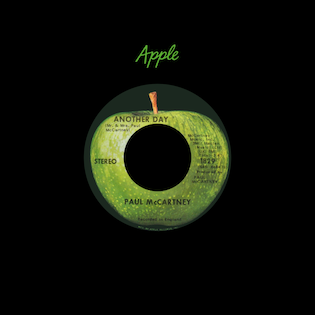
"Another Day" is a song by English rock musician Paul McCartney that was released as the A-side of a non-album single in February 1971. It was his debut single as a solo artist following the Beatles break-up in 1970. McCartney credited his wife Linda as a co-writer on the song, triggering legal action from ATV on behalf of the publishing companies Northern Songs and Maclen Music. The lyrics describe the daily routine of a lonely woman, using an observational style similar to McCartney's narrative in the 1966 ballad "Eleanor Rigby".
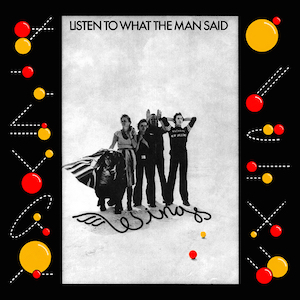
"Listen to What the Man Said" is a hit single from Wings' 1975 album Venus and Mars. The song featured new member Joe English on drums, with guest musicians Dave Mason on guitar and Tom Scott on soprano saxophone. It was a number 1 single on the Billboard Hot 100 in the US the week of July 19, 1975 and reached number 1 in Canada on the RPM National Top Singles Chart. It also reached number 6 in the UK, and reached the top ten in Norway and New Zealand and the top twenty in the Netherlands. The single was certified Gold by the Recording Industry Association of America for sales of over one million copies.

"Letting Go" is a song credited to Paul and Linda McCartney and originally released by Wings on their 1975 album Venus and Mars. The song was remixed and released as a single on 4 October 1975 in the United States, and on 18 October 1975 in the United Kingdom. The song peaked at number 41 in the UK, 41 on the Cash Box Top 100 and number 39 on the Billboard Hot 100.
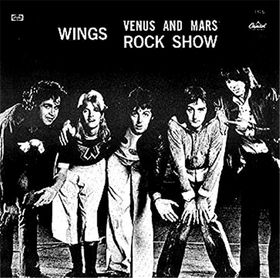
"Venus and Mars"/"Rock Show" is a medley of two songs written by Paul and Linda McCartney and originally performed by Wings that make up the first two songs of the album Venus and Mars. The single was released in the United States on 27 October 1975 and in the United Kingdom on 28 November 1975. The B-side is "Magneto and Titanium Man", another track from the album. The single version is considerably shorter than the album version of the songs; in the single "Rock Show" is cut by more than 3 minutes and "Venus and Mars" is cut by a few seconds. "Venus and Mars/Rock Show" peaked at number 12 on the Billboard Hot 100 in the US, but did not chart on the UK singles chart, the first McCartney penned single to do so. In the book The Rough Guide to the Beatles, Chris Ingham praised both songs, describing "Venus and Mars" as "atmospheric" and "Rock Show" as "barnstorming".

"I've Had Enough" is a song by the British–American rock band Wings, released as a single from their 1978 album London Town. It reached No. 25 on the Billboard Hot 100 chart, No. 24 in Canada and No. 42 in the UK as well as reached No. 11 in Ireland. In the Netherlands, the 2-sided single "I've Had Enough" combined with its B-side "Deliver Your Children" reached No. 13.

"London Town" is a song by the British-American rock band Wings. The title and opening track of their 1978 album London Town, it was the third of three single releases from the album, reaching No. 39 in the US, No. 43 in Canada and No. 60 in the UK. It also reached No. 17 on the Billboard Easy Listening chart in the US.
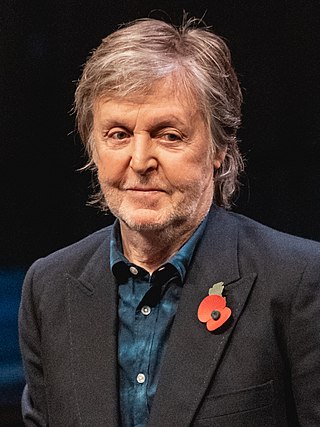
Sir James Paul McCartney is an English singer, songwriter and musician who gained worldwide fame with the Beatles, for whom he played bass guitar and shared primary songwriting and lead vocal duties with John Lennon. One of the most successful composers and performers of all time, McCartney is known for his melodic approach to bass-playing, versatile and wide tenor vocal range, and musical eclecticism, exploring genres ranging from pre–rock and roll pop to classical, ballads, and electronica. His songwriting partnership with Lennon is the most successful in modern music history.

"Bluebird" is a song written by Paul and Linda McCartney and originally performed by the British rock band Wings, released on their 1973 album Band on the Run. According to author John Blaney, it was written during a vacation in Jamaica. However, author Vincent Benitez claims the song was written as early as 1970 or 1971, noting that Paul and Linda sang the song during a live interview in New York City in 1971. In Continental Europe it was also released as the B-side of the "Mrs. Vandebilt" single.
"Call Me Back Again" is a song credited to Paul and Linda McCartney and performed by Wings. It was originally released on the album Venus and Mars. It was performed throughout their world tours in Australia and America and a live version was included on the album Wings Over America. It was also included on the compilation album Wingspan: Hits and History. The song was also included on the theatrical version of the film Rockshow, documenting the Wings 1976 tour, but was excluded from the laserdisc version of the film.

"Mamunia" is a song written by Paul and Linda McCartney that first appeared on Wings' 1973 album Band on the Run. It was also released as the B-side of the "Jet" single in the US, but was replaced by "Let Me Roll It" when "Mamunia" was being considered as a possible future A-side.
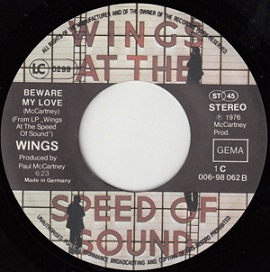
"Beware My Love" is a rock song credited to Paul and Linda McCartney that was first released on the Wings 1976 album Wings at the Speed of Sound. It was also used as the B-side of the single that included "Let 'Em In". A live version recorded on June 7, 1976, in Denver, Colorado, was included on the Wings' album Wings Over America and another live version from three days later in Seattle, Washington, was shown in the concert film Rockshow. An excerpt from the Rockshow performance was also included in the documentary Wings Over the World.

"Love in Song" is a song credited to Paul and Linda McCartney that was released on Wings' 1975 album Venus and Mars. It was also released as the B-side of Wings' number 1 single "Listen to What the Man Said." It has been covered by artists such as Helen Merrill and the Judybats.
"Little Lamb Dragonfly" is a song by Paul McCartney and Wings, composed by Paul and Linda McCartney and originally released on the 1973 album Red Rose Speedway. The song was originally recorded during the sessions for McCartney's Ram album in early 1971, and thus Hugh McCracken plays guitar on the recording rather than Wings' guitarist Denny Laine. However, Laine did provide backing vocals during the production work for Red Rose Speedway. McCartney originally intended to use the song as part of his Rupert and the Frog Song animated film project. Chip Madinger and Mark Easter noted that drummer Denny Seiwell may have assisted in writing the song, although he was not credited.
"She's My Baby" is a song credited to Paul and Linda McCartney that was first released by Wings on their 1976 album Wings at the Speed of Sound. It is a love song sung by Paul directed at Linda. Critical opinion of the song has ranged from a description as Paul McCartney's "sweetest, daftest love song" to a suggestion that it deserves an "honor for sheer awfulness." In 1998, after Linda's death, Paul McCartney rearranged the song for string quartet to be played at memorial concerts for his late wife. This version was included on the 1999 album Working Classical.
"Warm and Beautiful" is a love ballad credited to Paul and Linda McCartney that was first released by Wings on their 1976 album Wings at the Speed of Sound. It is a love ballad sung by Paul directed to Linda. Critical opinion of the song has varied widely, ranging from a comment that it is "one of the most beautiful songs that Paul ever wrote for Linda," to a suggestion that it may be "one of the worst songs Paul McCartney has ever written." In 1998, after Linda's death, Paul rearranged the song for string quartet to be played at memorial concerts for his late wife. This version was included on the 1999 album Working Classical.
"No Words" is a song written by Paul McCartney and Denny Laine, and first released on 7 December 1973 on Band on the Run by Paul McCartney and Wings. The song was Laine's first co-writing on a Wings album and his only writing credit on Band on the Run.
"Big Barn Bed" is a song by Paul McCartney and Wings from the band's 1973 album Red Rose Speedway. The songwriting credits are attributed to Paul McCartney and Linda McCartney.
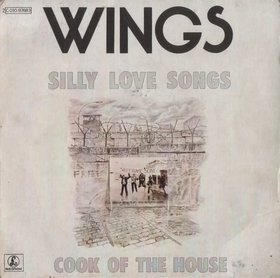
"Cook of the House" is a song written by Paul and Linda McCartney that was first released on Wings' 1976 album Wings at the Speed of Sound. It was also released as the B-side to the number 1 single "Silly Love Songs." The song was included on Linda McCartney's posthumous 1998 solo album Wide Prairie.
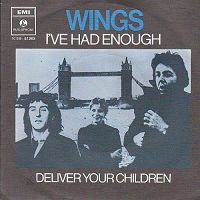
"Deliver Your Children" is a song written by Denny Laine and Paul McCartney that was first issued on Wings' 1978 album London Town. It was also released as the B-side of Wings' single "I've Had Enough". In the Netherlands, it received enough airplay to be ranked on the national charts along with its A-side, and joint single reached No. 13. On some charts within the Netherlands "Deliver Your Children" was ranked alone on the single charts, and it reached No. 9 on the Stichting Nederlandse Top 40 chart. Laine also released solo recordings of the song.

"Backwards Traveller"/"Cuff Link" is a medley of two short songs written by Paul McCartney that was first released on Wings' 1978 album London Town. The medley was also released as the B-side of Wings' US No. 1 single "With a Little Luck". Both "Backwards Traveller" and "Cuff Link" were recorded in October 1977 and completed in January 1978. By this point in the London Town recording sessions, guitarist Jimmy McCulloch and drummer Joe English had left the band, so the songs were recorded by only McCartney, Linda McCartney and Denny Laine.
References
- ↑ "Paul McCartney and Wings: Wings at the Speed of Sound, PopMatters". December 2014.
- 1 2 3 4 5 6 7 Guarisco, D.A. "Must Do Something About It". Allmusic . Retrieved 26 October 2011.
- 1 2 3 Madiger, C. & Easter, M. (2000). Eight Arms to Hold You. 44.1 Productions. p. 215. ISBN 0-615-11724-4.
- 1 2 3 4 5 6 7 Benitez, V.P. (2010). The Words and Music of Paul McCartney: The Solo Years. Praeger. p. 76. ISBN 978-0-313-34969-0.
- 1 2 Rodriguez, R. (2010). Fab Four FAQ 2.0: The Beatles' Solo Years 1970–1980. Hal Leonard. pp. 186, 216. ISBN 978-0-87930-968-8.
- ↑ Ingham, C. (2009). The Rough Guide to the Beatles (3rd ed.). Penguin. p. 118. ISBN 978-1-4053-8445-2.
- 1 2 Blaney, J. (2007). Lennon and McCartney: together alone: a critical discography of their solo work. Jawbone Press. pp. 114–115. ISBN 978-1-906002-02-2.